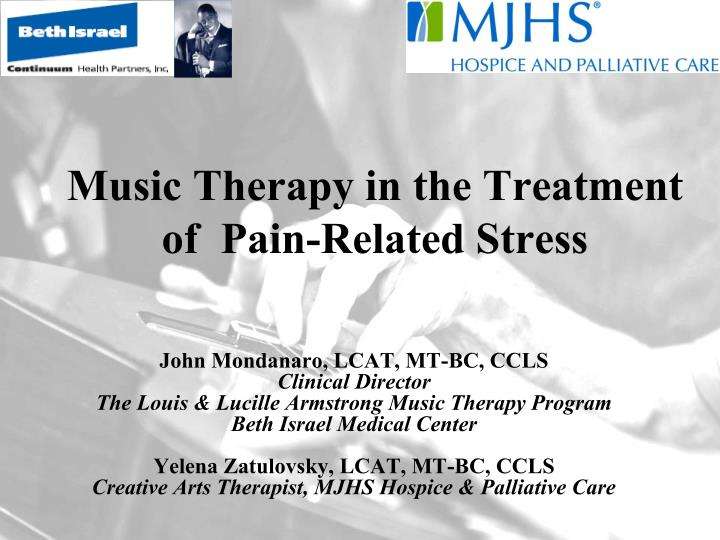-
Music Therapy in the Treatment of Pain-Related Stress John Mondanaro, LCAT, MT-BC, CCLS Clinical Director The Louis & Lucille Armstrong Music Therapy Program Beth Israel Medical Center Yelena Zatulovsky, LCAT, MT-BC, CCLS Creative Arts Therapist, MJHS Hospice & Palliative Care
-
What Is Music Therapy? Definition: The therapeutic use of music to address physical, psychosocial, and spiritual issues related to health and wellness.
-
LCAT Licensure Requirements MT & New York State Licensure The title of Creative Arts Therapist and Licensed Creative Arts Therapist or any derivative requires licensure in New York State. • Education Requirements: • MUST receive a Master’s or Doctoral degree in Creative Arts Therapy. • Experience Requirements: • MUST complete minimum of 1,500 contact hours of post-degree supervised experience in the practice of CAT. • Examination Requirements: • MUST pass a board certification exam within a creative arts therapy discipline. (Cited from http://www.op.nysed.gov/prof/mhp/catlic.htm.)
-
Release-Oriented Strategies • Music in Healthcare
-
Submit manuscript through the Music and Medicine online submission and review system athttp://mc.manuscriptcentral.com/mmd
-
The effects of music on function such as cardiac output, respiratory rate, pulse rate, circulation, blood pressure, electrical conduction of tissues, fatigue, pain, and on general vibratory effects on the body have been studied since the end of the 18th century.1, 2, 3, 4 1.Huang, S., Good, M., & Zauszniewski, J. The effectiveness of music in relieving pain in cancer patients: A randomized controlled trial. International Journal of Nursing Studies 2010; 47:1354-1362. 2. Diserens, C. The Influence of Music on Behavior. Princeton, NJ: Princetone University Press. (PhD thesis, University of Cincinnati, 1922);1926. 3. Azoulay, R. & Loewy, J. (Eds). Music, The Breath, and Health: Advances in Integrative Music Therapy. New York, NY: Satchnote Press; 2008. 4. Sand-Jecklin, K., & Emerson, H. The impact of a live therapeutic music intervention on patients’ experience of pain, anxiety, and muscle tension. Holistic Nursing Practice. 2010; 12, 24,1:7-15.
-
Release-Oriented Strategies The Pros and Cons of Live Music? • More expensive to implement a music therapy program • Generalizing Results: Difficult to quantify the effectiveness of individual music therapy treatment • Shift composition according to mood and preference of patient • Change tempo of music according to HR, RR of patient (entrainment) • Ability to control volume, regulate dynamic shifts • Enhance a feeling of reciprocity otherwise unavailable. • Provide clinical conditions and on-going updates to medical team.
-
Studies on the neurological effects of music indicate that at least 3 processes are stimulated. • Center of the brain and limbic system where emotional responses of pain, pleasure, blood pressure, and body temperature are also processed. • Activates a flow of stored memories across the corpus callosum leading to richer recall of association. • Excite peptides, which release endorphins producing a natural deterrent to the experience of pain. Mitchell, L.,Macdonald, R., & Knussen, C. A survey investigation of the effects of music listening on chronic pain. Psychology of Music. 2007; 35,1:37-57. Macdonald, R., Mitchell, L., Dillion, T., Serpell, M., Davies, J., & Ashley, E. An empirical investigation of the anxiolytic and pain reducing effects of music. Psychology of Music, 2003; 3:18. Available at:http://pom.sagepub.com/content/31/2/187
-
Current IRB Research Heather-on-Earth Multi-site Music Therapy Study: n=272 (completed March, 2009) AIP (Asthma Initiative Program): n=150/Clinic/3 schools-Bronx, Brooklyn, Lower East Side (Complete June 2010) Music for AIR (Advances in Respiration)n=75 CCPH & Nursing Homes (on-going) CAIR (Cardiac Advances in Respiration) (on-going) EEG Sedation Study: Chloral Hydrate vs. Entrained Lullabies n=60(complete) Helen Sawaya Resiliency Study-Chemo-Infusion n=75 (on-going) SpineSurgery: Effects of Music in Recovery n=60 (on-going) SICU-Impact of Live Music with Patients, Staff, and Caregivers n=120 (60 pts, 60 caregivers, 60, staff) (on-going) Radiation Oncology Impact of Live Music on Coping and Resiliency n=90 (on-going)
-
Application Of Music Therapy In The Hospital Setting Experience of Sound in the ICU The Effect of Music Therapy
-
Environmental Factors1,2,3 • Harmful Noise Levels • Mechanical Sounds • Harsh Lighting • 1.Macdonald, R., Mitchell, L., Dillion, T., Serpell, M., Davies, J., & Ashley, E. An empirical investigation of the anxiolytic and pain reducing effects of music. Psychology of Music, 2003; 3:18. Available at: http://pom.sagepub.com/content/31/2/187. • 2. Mazer, S. Music, noise, and the environment of care: History, theory, and practice. Music and Medicine. 2010; 2,3:1-10. • 3.Whitaker, M. Sounds soothing: Music therapy for postoperative pain. Nursing 2010; 53-54. Available at: www.Nursing2010.com
-
The Pain Experience • Physiological aspects will greatly influence stress, anxiety, and grief. Most significant is the presence and perception of pain, which can contribute to poorer psychosocial interactions and decreases in positive emotional states. • Pain is a subjective phenomenon. It is a sign of mental or physical suffering that may be influenced by emotional states of mind • Beyond the physical suffering, the spiritual pain may be so great that the patient may deteriorate due to a lack of hope, creating a cyclic effect to the perception and experience of pain – MT plays an essential role here
-
Music therapy in pain management: • Cognitive- the potential for music to refocus an individual way from the pain experience, associations, memory retrieval, life reflection, imagery & visualization • Affective- music may alter mood disturbances associated with chronic and life threatening illness e.g. depression, anxiety, fear, anger, sadness. • Sensory- spinal mechanisms in pain modulation. Pain and music processed in the same neural pathways. • Role of Endorphins- music may stimulate the endogenous system of pain modulation. Magill-Levreault, L. Music therapy in pain and symptom management.J Palliat Care 1993 Winter;9,4:42-8.
-
PROCEDURAL SUPPORT1,2 • Educate and advocate for position comforting. • Forming a plan that enlists caregivers in supportive roles. • Identify and Reinforce existing coping strategies • Identify new strategies • Refocusing interventions • Music therapy entrainment • Guided imagery • Breathing techniques • Storysong • 1.Loewy, J., Hallan, C., Friedman, E., & Martinez, C. • Sleep/sedation in children undergoing EEG testing: A comparison of chloral hydrate and music therapy. Journal of PeriAnesthesia Nursing. 2005;(20), 5:323-331. • 2.Mondanaro, J. Music therapy in the psychosocial care of pediatric patients with epilepsy. Music Therapy Perspectives. 2008; 26,2:102-109.
-
“…We Shall Meet On That Beautiful Shore” Music Therapy Case Study – ‘Jose’
-
Reasons For Referral • Physical needs • Altered breathing patterns • Declined gross- and fine-motor function • Psychosocial needs • Spiritual distress – desire to maintain faith – possibility for distraction • Impaired coping – anxiety, stress and depression related to illness – vicious cycle affecting perception of pain • Relationship conflicts – with self, staff, and family
-
Goals Following MT Assessment • In the more immediate, to facilitate opportunities for comfort, thereby decreasing anxiety • Enhancing relaxed breathing patterns • To help the patient resolve inner conflicts • Accepting the “new” self and finding new means for expression – in turn decreasing anxiety & stress • Coping with feelings of loss of self • To help the patient fulfill personal dreams • Leaving a legacy
-
PSYCHOTHERAPEUTIC SUPPORT1,2 • Expression • Reflection • Identify and Reinforce existing Coping Strategies • Catharsis • Cultural, Spiritual, Social, • Familial Connection • 1.Krout, R. The effects of single-session music therapy interventions on the observed and self-reported levels of pain control, physical comfort, and relaxation of hospice patients. AMJ HospicePalliative Care. 2001; November/December 18,6:383-390. 2 • 2.Azoulay, R. & Loewy, J. (Eds). Music, The Breath, and Health: Advances in Integrative Music Therapy. New York, NY: Satchnote Press; 2008.
-
MT’s efficacy is due to its noninvasive nature, ability to create familiarity, and source of comfort – Johnston and Rohaly-Davis (1996) Certain symptoms and side effects may be relieved by the conscientious work of the MT – American Cancer Society (2001) Music which is selected, preferred, or meaningful to the patient is most effective in bringing about intended results of medical interventions – Bailey (1984), Cook (1981), Spintge (1989) A variety of psychological variables play a role in the experience of pain – memories of previous experiences, understanding the origin of the pain, cultural factors, anxiety and its relationship, expectations, etc. – modifications of negative thoughts could provide a decrease in pain – O’Callaghan (1996)
-
Contact Info John Mondanaro MA, LCAT, MT-BC, CCLS [email protected] 212.420-2722 Louis Armstrong Center for Music and Medicine on www.musicandmedicine.org Yelena Zatulovsky, LCAT, MT-BC, CCLS [email protected] 347.844.1028 www.mjhs.org
MUSIC THERAPY – Life is a like a rainbow, it is a mix of colors and emotions. there are times when we feel blue and
Music Therapy – . by sarah carr and deanna flook. ice breaker. close your eyes listen to the music and write down how you
Music Therapy – . grooves to help your moods. by: jessica thorpe health promotion major enjoy listening to music of all
Music Therapy – . created by: marshaw bigman. what is music therapy. a treatment method that involves using music to
Physical Therapy Can Help Stress-Related Headaches – Tension headaches fall into this category, and involve the sensation
STRESS NO MORE OVER STRESS-RELATED HEADACHES! PHYSICAL THERAPY CAN HELP RELIEVE THE PAIN – Can you feel it? starting with
Overview
What is music therapy?
Music therapy is the clinical use of music to accomplish individualized goals such as reducing stress, improving mood and self-expression. It is an evidence-based therapy well-established in the health community. Music therapy experiences may include listening, singing, playing instruments, or composing music. Musical skills or talents are not required to participate.
Music therapy may help you psychologically, emotionally, physically, spiritually, cognitively and socially. A short list of benefits includes:
- Lowering blood pressure.
- Improving memory.
- Enhanced communication and social skills through experiencing music with others.
- Self-reflection. Observing your thoughts and emotions.
- Reducing muscle tension.
- Self-regulation. Developing healthy coping skills to manage your thoughts and emotions.
- Increasing motivation.
- Managing pain.
- Increasing joy.
Formal music therapy was defined and first used by the United States War Department in 1945. It helped military service members recovering in Army hospitals with occupational therapy, education, recreation and physical reconditioning.
Who do music therapists work with?
People of all backgrounds, ages and cultures can respond to music, and to music therapy. Notable groups music therapists have helped include:
- Military service members and veterans. Music therapy helps you cope with trauma.
- People with Autism Spectrum Disorder (ASD). Individuals on the spectrum learn best when there is familiarity, structure, predictability and consistency.
- Individuals with Alzheimer’s disease. Music therapy may help with memory and stimulate your mind because of predictability, familiarity and feelings of security.
- People in correctional settings. If you’re incarcerated, in a mental health facility, half-way house or group home, music therapy may help with problem-solving, communication skills, relaxation and decreasing impulsivity.
- Victims of trauma and crisis. If you’ve experienced trauma and crisis, you might have anxiety, stress and pain. Music therapy can help you with decreasing those three experiences, improving your mood, feeling confident and in control and providing a non-verbal outlet for emotions.
- Those who are physically ill. The list includes, but is not limited to people with chronic pain, diabetes, cardiac conditions, cancer, headaches, recent surgery and people in rehab.
- Individuals with mental health disorders. If you’re dealing with a mental health disorder, music therapy can help you with communication and expression, help you explore your thoughts and feelings, improve your mood and concentration and develop coping skills.
- People with chronic pain. Music therapy can help decrease your pain, anxiety, fatigue and depression.
- Substance abusers. Music therapy may help if you have a substance abuse disorder. Research has shown that it can increase motivation and self-esteem, reduce muscle tension, decrease anxiety, improve self-awareness and strengthen coping skills.
Where does music therapy take place?
The most common settings are hospitals, schools, nursing homes, outpatient clinics, mental health centers and residences for individuals with developmental disabilities. Music therapists also go to juvenile detention facilities, schools and private practices.
Is music therapy outpatient or inpatient?
Whether the music therapy is delivered outpatient or inpatient depends on the individual program. You may be able to come in for sessions during the day (just like a counseling appointment), or a music therapist may come to you while you’re admitted into the hospital or at school. Sometimes music therapy is held in groups.
Do music therapists work with children and adolescents?
Yes. Music therapy may help with the following:
- Behavior disorders.
- Mood and anxiety disorders.
- Attention deficit/Hyperactivity disorder (ADHD).
- Autism spectrum disorders (ASD).
- Trauma.
- Substance abuse disorders.



